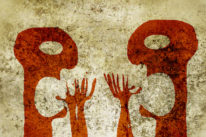
“Listening is a magnetic and strange thing, a creative force. The friends who listen to us are the ones we move toward. When we’re listened to, it creates us, makes us unfold and expand.” ~Karl A. Menninger
I remember my first call like it was yesterday.
I answered the phone, heart beating out of my chest, hand firm on a sheet of local emergency phone numbers.
The voice on the other end was full of… meek embarrassment.
Not exactly what I was expecting.
“Uhh, I’m really sorry… I’m not, uhh… I’m not suicidal…. I just… I just had a huge fight with my girlfriend…. I just… I really need to talk to someone…. Is that okay?”
If you’re like I was before I became a volunteer in 2011, when you think about a suicide hotline you imagine circumstances so traumatic and unbearable that they bring people to consider ending life.
But, I soon discovered that everything I expected to be true—everything from what the callers would be like, all the way up to how I would handle them—was completely wrong.
And what I learned forever changed the way I think about pain.
My First Big Surprise About Pain
I became a volunteer because I wanted to help people who were hurting.
But looking back, I realize that I had a big misconception about what those people would look like.
I imagined two discreet groups: “normal” people living with minor ups and downs in one bucket; and “broken” people struggling with trauma and unrelenting emotional upheaval in the other.
(I had imagined I was in the “broken” category, but that is a story for another day.)
I was sure callers to the hotline would fall into the latter bucket, too.
Which is why I was very surprised when I found myself speaking with “normal” people over and over again, people who I might easily have met behind my local coffee shop counter or in the grocery store aisle.
I began to see that we are all vulnerable to pain so big that we might reach out to an anonymous ear in order to pour out our hearts.
I realized that some of us may struggle with mental illness, but none of us are “broken.” Feeling extreme pain is simply part of the human condition.
But that was just the very beginning of what I was to learn.
What We All Need More Than Anything Is to Be Seen
I thought my work at the hotline was going to be about giving advice. Indeed, I looked forward to it.
I imagined helping callers develop coping techniques.
I pictured using my keen insights to help identify root problems.
I fantasized about offering guidance toward self-transformation.
But, although I didn’t understand at first, all of these things were actually forbidden at the hotline. My role was to be an attentive listener.
That’s it.
This only began to make a little bit of sense when I realized that there was just one thread running through each of the hundreds of stories shared with me by callers: a lack of a trusted confidante.
What each and every caller had in common was a deep craving to share themselves with a caring listener. Our job as volunteers was to offer this.
Okay, that made sense to me. In a world filled with busy, stressed out people, it’s too easy to feel like we don’t really matter to anyone beyond fulfilling our obligations, if at all.
Maybe it was this feeling—the feeling of being invisible—that was bringing so many callers to the brink of despair and onto our phone-lines.
“Mmm, it sounds like you feel…”
This simple string of words was taught to volunteers in order to make callers feel deeply seen and acknowledged.
But are you wondering (as I did) how simple parroting is supposed to do anything substantial?
Didn’t the callers also need help?
Yet I found that callers were indeed substantially moved when they received undivided and caring attention.
Someone might begin a call in a frantic tone of desperation only to end it with a sense of peace and hope, all because a volunteer fully acknowledge their complete being.
Eventually, I even began to see that well-meaning “help” (like advice or personal anecdotes) could actually be damaging.
Telling someone in pain about ideas based on our experiences crowds out what a distressed person really needs—a reflection, pure acknowledgement, to be seen.
We Are All Profoundly Resourceful
Despite callers’ uplifted moods, for a time I was still skeptical about the usefulness of empathetic listening.
But if I am being honest with myself, my problem was that it made me feel unimportant.
If all I was doing was holding up a mirror for callers, how was I supposed to get satisfaction out of my work? Didn’t some of them need my hard-won wisdom?
But I soon noticed something interesting.
Since most callers lacked a sounding board for their deepest feelings—buried anger, forgotten hopes, disappointments—many of them started to lose touch with those feelings until they bubbled over into a catastrophe.
Callers often didn’t even know they were calling the hotline to talk about their uncomfortable feelings.
They called the hotline to talk about tangible problems—major relationship conflicts, getting fired, losing a friend.
I started to notice that it was only after having the chance to speak without interruption for several minutes, receiving only empathetic sounds of understanding and reflection in reply, that they would even begin to unpack the twisted mass of pain in their hearts.
And that’s when I caught a glimpse of the magic beginning to happen.
Once the mirror I offered allowed callers to glimpse hidden corners of their inner worlds, they were empowered to keep exploring.
Soon, they were clearing away cobwebs and dusting off all kinds of rusty tools and insights, all as I sat, phone propped on my shoulder and mouth gaping at the miraculous turnarounds that had virtually nothing to do with me.
The truth was that callers didn’t need to hear about how I fixed my own kinda-similar problem.
They didn’t need to hear about what my friend did in the same situation.
Indeed, hearing my own musings would have interrupted the magic process.
My ego was disappointed at first, but watching someone else regain their footing is immensely more satisfying than patting yourself on the back.
Instead of my wisdom, I begin to take pride in my ability to convey empathy and ask questions, encouraging callers to dig deeper.
I was truly happy to be doing my small part in helping callers tap into their immense personal resources.
Having Our Feelings Validated Is Transcendent
I was thrilled to be witnessing this new power—the power of skilled and empathetic listening. I saw that it was emotionally replenishing for callers and empowered them to calmly analyze their hearts and their worlds.
But there was something else going on, too. Something that seemed almost spiritual.
I felt it, too. When I got off of a call, I sometimes felt a little dizzy, a little euphoric.
But why was I feeling so uplifted by conversations that started because someone had been feeling hopeless and alone?
What I came to realize is that empathetic listening offers a lot more than soothing companionship.
Empathetic listening and acknowledgement also means giving someone the chance to feel like they fit into the order of the world.
It means allowing someone to feel like a puzzle piece slotting perfectly and seamlessly into something bigger than themselves, like they belong. It is truly transcendent.
And since the act of empathizing deeply with another person means becoming one with them for a short time, as a volunteer I was experiencing the transcendence, too.
With every call I felt a part of a bigger whole. I felt connected.
And by the way the callers often thanked us volunteers, sometimes even through tears of relief, I knew they felt connected, too.
Connection is the Ultimate Emotional Pain Pill
Volunteering at the suicide hotline convinced me that listening and connection are so powerful that they can relieve even the deepest pain.
I might not have found my chance to shine as a skilled sage, but discovering that even the most troubled among us can begin to regain footing was infinitely more satisfying.
“Yes, absolutely, it’s okay.” I said to my first caller. “It sounds like you feel really, really upset. Tell me more about that.”
Couple hugging image via Shutterstock
About Katharine Di Cerbo
Katharine Di Cerbo left psychology research to start helping those of us who feel alone, despite lives filled with people, and would enjoy more emotional connection. Download her FREE LISTENING CRAFT GUIDE—based on the techniques she learned as suicide-hotline volunteer—to learn about how skillful listening can help you do just that.













 Though I run this site, it is not mine. It's ours. It's not about me. It's about us. Your stories and your wisdom are just as meaningful as mine.
Though I run this site, it is not mine. It's ours. It's not about me. It's about us. Your stories and your wisdom are just as meaningful as mine.
What an amazing experience Katherine! Such a well-written post, I could visualise you sitting and actively listening to the callers, the every day people who just need someone to really BE there for them amongst the madness of 21st century life. As a coach I can empathise with your initial challenge to let go of your ego, wanting to be able to give advice from your vast collection of wisdom gained through experience and study – and also the incredible insights that people can have by working through their pain themselves, knowing someone is walking alongside them, and not judging them.
“It means allowing someone to feel like a puzzle piece slotting perfectly and seamlessly into something bigger than themselves, like they belong. It is truly transcendent.”
Brilliant!
A lesson to us all to discover more space to listen to the people we love, unconditionally, and recognise what’s truly important in life (and it’s not making more money and buying more stuff!).
Thank you Katherine 😉
Thanks, Sandra! And it’s tough as a coach to just listen too because of the short piece of time that you have with each client! I’ve seen a lot of coaches feel pressure to DO something, which is completely understandable. But ironically, sometimes not doing is more powerful. Thanks again for reading and commenting, I really appreciate it 🙂
~Katharine
Such an important lesson for all of us coaches as well as those of us in relationships.
I have learned this again and again as I catch myself trying to “fix” instead of “allowing” to expand and heal. “Holding Space” as a coach is truly the most important gift that we bring to the coach-client relationship. Thank you Katherine, for eloquently shining the light on this critical and meaningful topic.
This is deeply important to those of use living with some kind of chronic pain syndrome as well. We don’t need to hear the myriad suggestions of “have you tried…” or “If you just do x….”, or “have you heard about this pill/product/therapy/etc”. When we say we hurt too much to make dinner or sweep the floor or even stay on the phone, we mean it. Don’t ask “How can I help?” We’re often in too much pain to concentrate on making that kind of decision. Validate our pain and needs without saying you understand (because you can’t, sorry.). Tell us, “Yeah, that sounds like it sucks. Sorry you have to feel that.” Offer to let the dog out. Rent a movie and watch it with us. Be willing to sit there and listen. Sometimes support means more than an attempt to “fix” anything.
Katherine I think this line”My ego was disappointed at first” sums up everything in in your fantastic post.
If we can just get out of our own way long enough we will see tranformation in others, if we aren’t thinking about what to say next or trying to look good or changing the subject because we are uncomfortable, people often find their own way… you just proved that.
Unfortunately it’s a skill that has been buried in most people. If we just let people be themselves instead of trying to make them image a mirror of us, then the biggest problem we will have is trying to stop them talking lol.
Excellent post.
Ha yes! If you become a great listening, people will want to be around you all the time! It’s so true. 🙂
Thank you for sharing your perspective because I think your point is so important for people to hear – being there for someone in a painful situation that is chronic means just empathizing because of course they have uncovered every stone already trying to get out of pain!
Hi Chris, Yes, as I mentioned above to Sandra, I empathize with coaches trying to commit to holding space because when you are getting paid to do a job it can feel really weird not to be moving forward with lot’s of directed action. But life is full of counterintuitive mysteries, isn’t it? 🙂
Hi Sandra! Thank you for sharing. This is valuable advice. Sometimes we just need to be there and let people figure things out on their own.
My pleasure. Thanks for reading!
Wonderful post! Thank you for sharing your experience and learned lessons! What a great reminder how important listening and allowing another person to feel seen IS!! 🙂 Beautiful!
Superb post! I have done some volunteering recently and even though I’m super busy it has been worth every minute.
This is honestly the most insightful article I’ve read in a long time. I agree with everything you’ve said and I will try to be a better listener for my family and friends as I often try to empathize by telling stories or sharing experiences but now I realize you are right — they just want to be heard which in turn lets them untangle their own issues and feelings.
Thank you Viv for the incredibly kind compliment! I’m so glad I was able to offer something fresh to try.
Thanks Tim! Yes, volunteering is great even when we’re super busy. It’s like that saying “Meditate 30 minutes everyday. If you’re too busy, meditate for an hour” 🙂
Thank you for the very kind compliment. Feeling seen is such a great feeling, isn’t it?
I agree with what you are saying. But, I would to bring my experiences about listening to people ‘s pain to you. Everyone that I have listened to including initially my mother, later my husband, boyfriends and even my own patients became aggressive to me after I listened to them. I became a SCAPEGOAT. Well, at this point after 35 years of knowledge and experiences in human psychology, human relationships, I DECIDED that I had enough. I do NOT want to be a scapegoat any longer. Well, I do not listen any longer. Thank you. Dr. Marie Blair. Please call me on my cell phone 516-710-3010 for further explanation.
Beautiful! Got goosebumps reading this (and I am sure its not the AC this time). Resonates with me. Thanks. Thanks a lot. Especially the part where you mentioned that our ego might be a little disappointed, but some other magic begins. Beautiful!
Thank you so much, Supriya! Thank you for reading!
Hi Marie, I’m very sorry you had to experience that, that sounds awful. This is something I didn’t mention in my post, but I agree with your point – sometimes a person can essentially spew at another person without their consent. It’s amazing to me that humans are so porous so to speak when it comes to absorbing each other’s feelings. And there is a huge difference between giving someone permission to share their feelings and having those feelings imposed on you time and again without your permission. Thank you for sharing this point.
~Katharine
Great article, Katharine.
It is like we spoke about, when people are in pain much of the time they don’t want us to be there for them (implication of ‘doing’ something), but just to simply be there with them. To sit and just listen can feel like we are useless at first, but if we can just sit with it long enough then we get to see the magic happen. And as there are so many different nuances between people, advice can often end up doing more harm than good. As you said, listening creates a connection, and I think after all is said and done, that connection is what we need more than anything else in life. So, isn’t it wonderful when we get the opportunity to offer this great gift?
Geez with this article! It’s so, so hard, particularly because I live in a very (very!) small town, and being “seen” is not the problem- more is seen than you can possibly be comfortable with, so you have to create that banal veneer of bland pleasantry in order to have any privacy whatsoever. Soon it gets to the point where you’re not sharing anything with anyone beyond a social smile. It feels like the only two options are naked in the spotlight or alone in the crowd. I’ve gotten to the point where I can’t even share with the people I love, I’ve become so closed off without appearing to be that they don’t even know me anymore. And I’m their sounding board, their go-to, and I have to pretend to be what they need me to be while hiding what I really am. I try to hint at what’s inside and the response is “but you’re always so ‘fill in the blank'” and at those moments I’d give just about anything to have a stranger who would actually listen without expectation or repercussion, to be able to say all the things that are inside me without it damaging the perception the listener has of myself because, to me, they would have no perception at all. I honestly didn’t know you were able to call and just speak your peace without actually being immediately suicidal. I think if I had a phone I’d probably call a suicide hotline every day just to unburden myself.
This is beautiful! Thank you so much for sharing your experience and insight. More people should be reminded about this simple truth, that we don’t need secret knowledge or to be gurus and psychologists to give proper support to people around us going through pain. We all have this power.
Thank you, Polina! I love the way you put that.
Hi Emily, Thank you so much for sharing your perspective – “Naked in a spotlight or alone in a crowd” – wow, that is very visceral. I feel like I can really imagine those two extremes.
Why do you feel like you need to pretend to be what other people need you to be? You mentioned that you sometimes try to hint at what’s really inside, but have you ever tried being more forceful? What happens?
~Katharine
Hi Keith,
Thank you!
I really agree with your point that there are so many different nuances between people that advice loses some usefulness just based on that fact.
And yes, it is wonderful to give that to someone else, I agree 🙂
~Katharine
Wow. I think I need this. Could I do that? Just call a hotline and talk about what I’m going through and be listened to? It’s kind of pathetic that at 65 I don’t have someone in my daily life I could talk to like that, but there it is.
Yes, you can! And I’m very sorry to hear that you feel your situation is pathetic. I think many, many people are in a similar situation, which is tragic, but not pathetic in my view. Hugs to you, and please do not be ashamed to take advantage of a resource like a crisis hotline!
This is how they should do it. Many people including myself get a lot of hesitation when the conversation becomes sympathetic rather than empathetic. Great article. 🙂
Very pleased to have chanced upon your post Katharine. Thank you for succinctly sharing your experience. Wonderful!
Katharine, I absolutelly love this article. Every time you introduce a new idea, I get exasperated, because I don’t agree with your initial “position” or whatever, but what I appreciate greatly is your complete honesty and clear-eyed observation which guides you quickly onto an insightful new position that I find myself in agreement with. So, it is a joy to read in general.